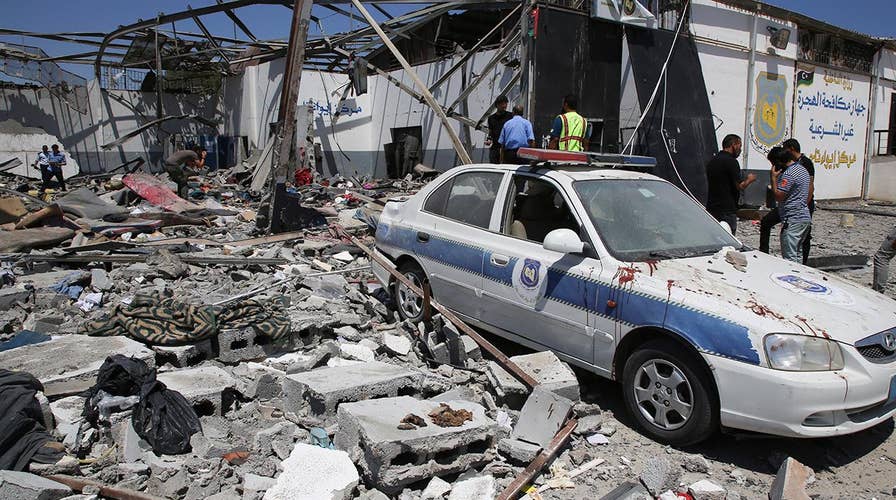Libya strike kills dozens of migrants at detention center
United Nations spokesman says strike on migrants should never have happened; Benjamin Hall reports from London.
President-elect Joe Biden on Monday tapped Jacob Sullivan to be America's next national security adviser.
Only it remains to be seen if the former top Hillary Clinton adviser, who championed the ill-fated unraveling of Libya almost a decade ago, will take heed of those lessons learned.
Sullivan, 43, comes with a storied pedigree of foreign policy experience, having served as a senior policy adviser to Clinton's 2016 presidential election campaign, deputy chief of staff at the Department of State under the Obama administration, and then-Vice President Biden's national security adviser, along with multiple degrees, fellowships and professor posts at Ivy League schools.
Under Obama's guise, Sullivan was part of the exclusive team working to restore ties to Cuba and nut out the 2015 Iran Nuclear Deal. But perhaps Sullivan's greatest influence in the scope of framing world events came earlier when he joined Clinton as her deputy chief of staff and director of policy planning, playing a pivotal role in procuring policy when it came to Burma, Syria and, most crucially, Libya.
US SHOULD ENCOURAGE CHINA'S RISE, BIDEN NATIONAL SECURITY PICK JAKE SULLIVAN SAYS
Indeed, Sullivan worked as Clinton's close confidante in the Libya plan, which was developed months in advance of the October 2011 takedown of long-running dictator Moammar Qaddafi, just as the Arab Spring accelerated. This was followed almost 11 months later by the slaying of Ambassador Chris Stevens and 3 other American contractors in Benghazi, yet those tragedies are only a portion of the Libyan quandary.
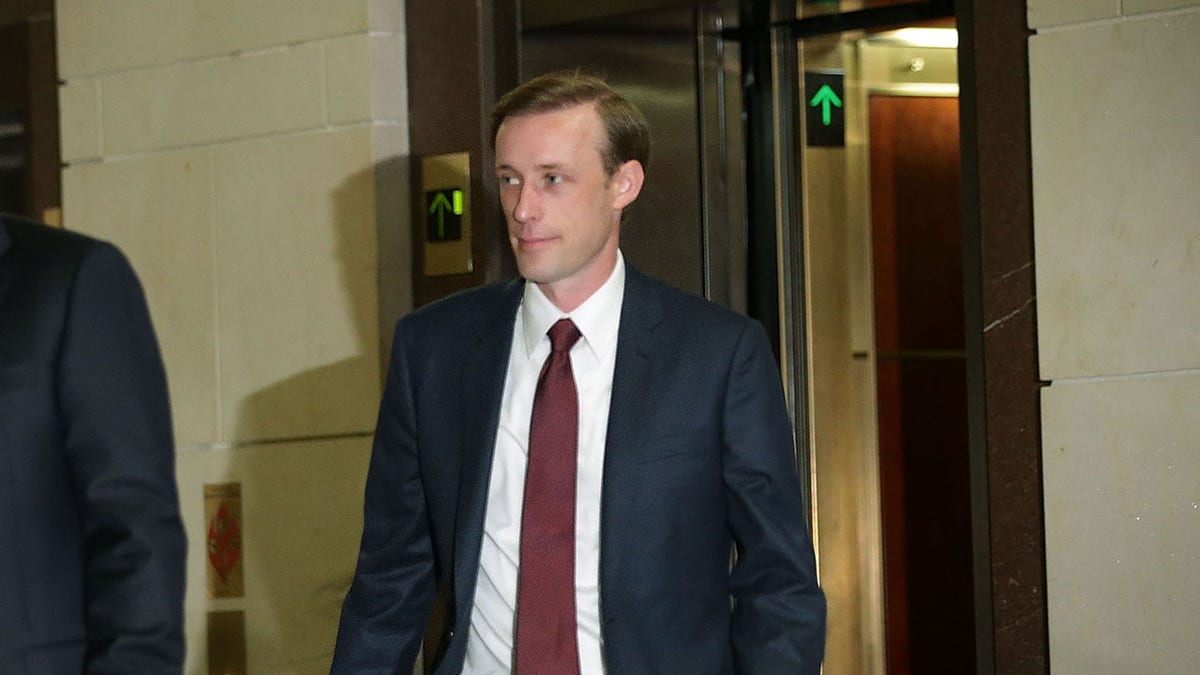
(Jake Sullivan at the Benghazi hearings Photo by Alex Wong/Getty Images)
Since the 2011 intervention, the oil-rich and once prosperous North African nation has spiraled into both a failed state and terrorist sanctuary.
"The U.S. war in Libya was a predictable error—a cheap mistake for Americans and an all-consuming disaster for Libyans. Overthrowing the government left a lack of functional institutions and central authority and eventually created a second civil war," Benjamin H. Friedman, Policy Director for Defense Priorities, told Fox News. "Warnings about the folly of an airpower-enabled regime change war and the likelihood of prolonged, violent disorder came from in and outside the State Department and were ignored by its leaders."
A source involved in Libya policy in Washington throughout this time, speaking on background, told Fox News that Sullivan was a prominent – albeit quiet – player with Clinton's unflinching support.
But with the sudden defection of top U.S. diplomatic figures for Libya, muddying the already confusing situation on the ground, the source stressed it was hard for Sullivan or anyone else in Washington to paint a really accurate picture of what was at stake in the weeks leading up to the Qaddafi's death.
Yet in the bitter aftermath of the subsequent intervention, Sullivan's name emerged on an email chain, which was later handed over to the House committee investigating the Benghazi attack, as the one touting the move to remove the controversial ruler, underscoring that "we need to live in a world of risks."
WILL THE UNREST IN LIBYA AND NATO'S SCHISM DRAG US BACK INTO CONFLICT?
As per August 2011 emails, Sullivan exulted his boss's timeline and her "leadership/ownership/stewardship in this country's Libya policy from start to finish."
"HRC has been a critical voice on Libya in administration deliberations, at NATO, and in contact group meetings," Sullivan wrote. "She was instrumental in securing the authorization, building the coalition, and tightening the noose around Qadhafi and his regime."
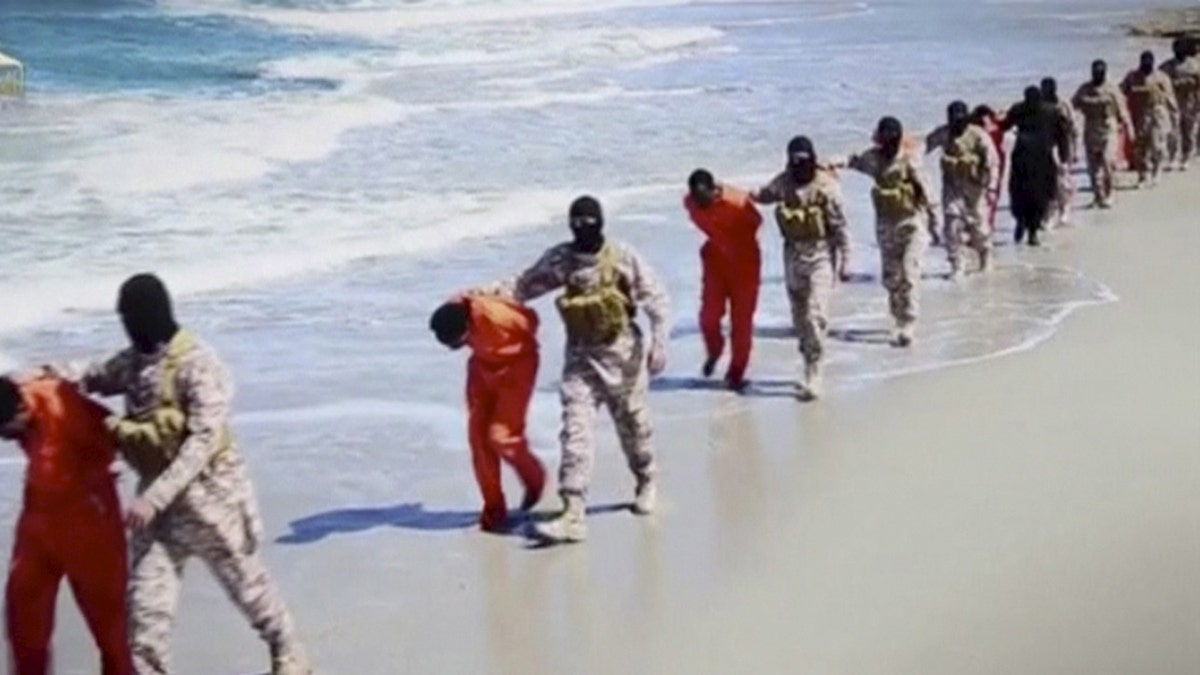
Islamic State militants lead what are said to be Ethiopian Christians along a beach in Wilayat Barqa, in this still image from an undated video made available on a social media website on April 19, 2015. REUTERS/Social Media Website via Reuters
Sullivan referred to Clinton as the "public face of the U.S. effort in Libya."
However, the ill-prepared post-Qaddafi world quickly became one fueled by anarchy, death, destruction, terrorism, and trauma for all who still suffer through the protracted civil war. More than a year after Sullivan's email was sent, Benghazi would tarnish the Clinton touting.
Sullivan's memo further chronicled Clinton's role in Libya, underscoring her role pushing for United Nations sanctions against Qaddafi, as well as collaborating with coalition forces around the NATO mission to impede in the brewing Libyan conflict.
According to a 2015 profile of Sullivan on Vox, the "hawkish" advisor and Clinton both adhere to the notion of "smart power," a concept developed by Harvard professor and former Defense Department official Joseph Nye, which encompasses the use of both hard power favored by hawks (military threat, force, and sanctions) and the soft-power levers favored by foreign policy doves (foreign aid, forging cultural and economic bonds, and negotiation).
Qaddafi's assassination – preempted by his capture, cowering in a sewer pipe in Sirte, a spate of physical torture and sodomy by means of a bayonet – came eight months into the Arab Spring that began in neighboring Tunisia and ripped through swaths of the Middle East and North Africa. If tensions were high before, they subsequently skyrocketed after, which the dictator's weapons cache promptly looted and disseminated to jihadist hotspots across the region.
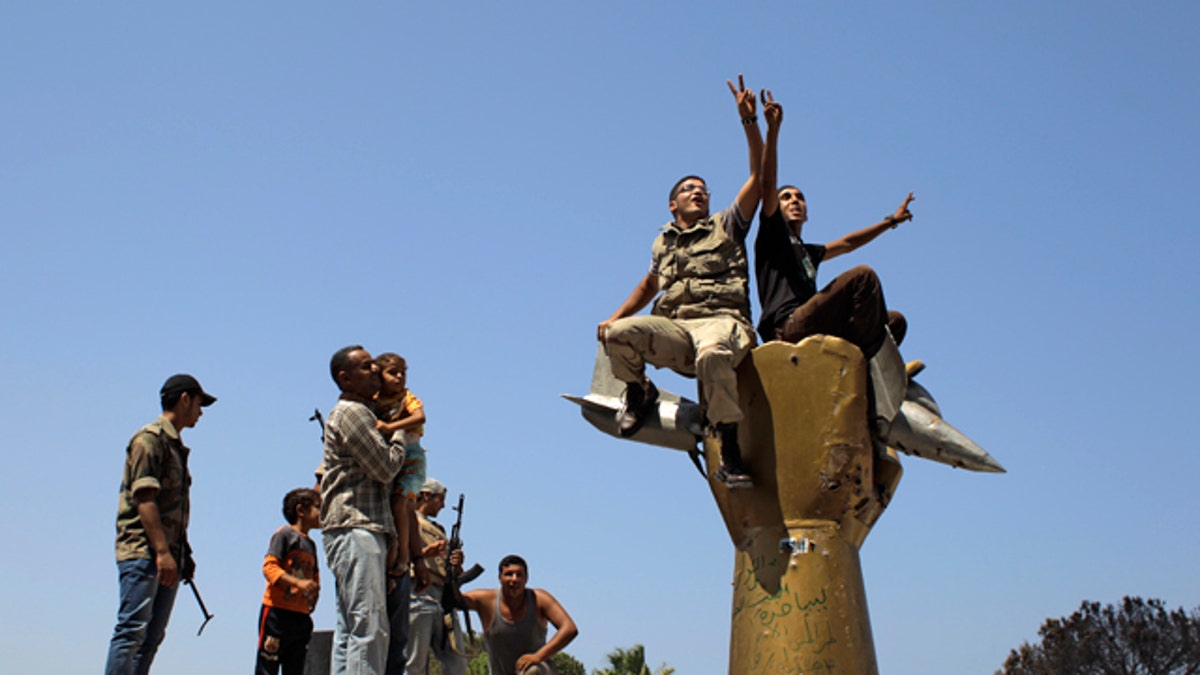
Aug. 24: Rebel fighters celebrate as they stand on top of the monument inside Qaddafi's compound in Bab Al-Aziziya in Tripoli, Libya. (AP2011)
Also, in 2011, NATO launched a controversial air campaign to stamp out the increasing pockets of organized crime syndicates and terror outfits, but the anguish for some locals only deepened as civilian casualties rose.
"They might think they are bombing terrorists," one Benghazi-based engineer, hiding in his family home under the insistence it was too dangerous to leave, recalled to Fox News. "But they are bombing our country, our houses, our streets."
Compounded by the tragic attack on U.S. installations on Sept. 11, 2012 – of which all American personnel was hurriedly evacuated – this not only irreversibly impaired Washington's Libya policy, but it impacted the entire way in which U.S. government and contracted personnel can operate in even mildly hostile regions today.
For places like Afghanistan and Iraq and even stable nations in the region, this means next to never stepping outside the shrinking wire – which some diplomats have lamented has altered their ability to interact on the ground and ascertain the needed scope to make informed decisions.
Clinton may have left her secretary post in early 2013, but Libya's political pain only proliferated– with little diplomatic presence to steer the rebellion that gripped the fragile country – leading to two disputed governments and the rise of terrorist outfits from al Qaeda in the Islamic Maghreb (AQIM) to ISIS.
As it stands now, it's hard to imagine that Libya was ever a stable place, presided over for decades by an eccentric colonel and authoritarian who took the nation's throne in a 1969 bloodless coup.

French President Nicolas Sarkozy, left, greets Libyan leader Col. Moammar Gadhafi upon his arrival at the Elysee Palace, in Paris, Dec. 10, 2007. (Associated Press)
Instead, an escalating open trade of human beings has propelled hundreds of thousands to flee north across the Mediterranean; countless are drowning in the process. Entire cities have been reduced to rubble; thousands have been killed in the crossfire of conflict, with little in the name of government protection.
BIDEN PICKS BLINKEN, MAYORKAS, SULLIVAN FOR KEY CABINET POSITIONS
Despite the fact that previous diplomatic endeavors have all come up empty, Libya's sparring factions are meeting this week in yet another bid to bring an end to the split governments, both backed by their own array of militias and foreign powers, by discussing who would be best to lead a transitional government into elections late next year.
The U.N.-hosted dialogue – which failed to name an executive authority in its first round of talks – features 75 members who have agreed to name a volunteer legal committee to craft the "constitutional basis for the election." Nonetheless, the process has been plagued before it even properly begins, with the U.N. mission in Libya now forced to open an investigation into allegations of some participants accepting bribes to vote for particular players to be named to the transition team.
And while Clinton herself is now far removed from the tragedy that is Libya, and rebuffed responsibility in a 2015 House Committee hearing, it is unclear if Sullivan harbors a similar stance.
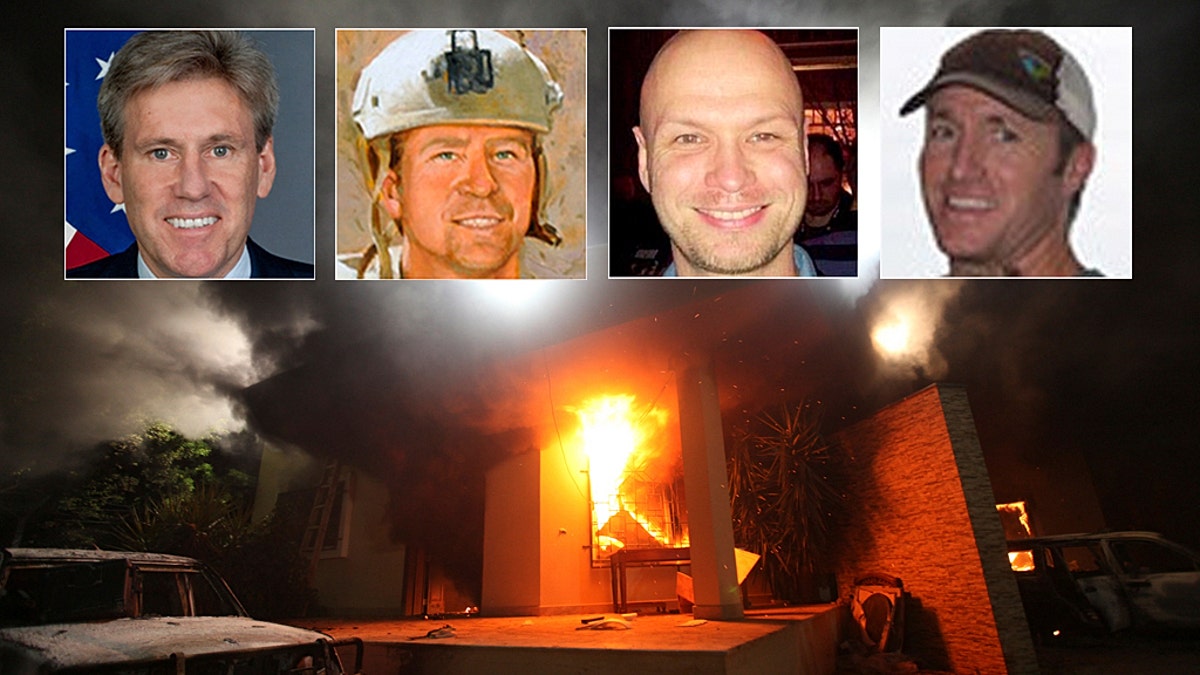
The U.S. Consulate in Benghazi is seen in flames during a protest by an armed group said to have been protesting a film being produced in the United States on September 11, 2012. REUTERS/Esam Al-Fetori
In Washington circles, he has both a legion of critics and condoners. Several inner-policy sources begrudged his academic background and lack of on-the-ground years, while others lauded his extensive qualifications and ability to analyze.
According to Brett Bruen, former U.S. diplomat and Director of Global Engagement at the White House, Sullivan "has spent a lot of time working at the highest levels with our country's national security leaders."
"There is a palpable sense of relief amongst defense and diplomatic types that things will be much more methodical and measured," he said. "The best way to repair our foreign policy is to put career officials in charge."
Moreover, Bokhari conjectured that Sullivan has had a long time – almost a decade – to reflect on what went wrong in Libya.
"He has also had stints in academia, the private sector, and political life. All these factors have likely helped him better appreciate the constraints that we face when dealing with foreign conflicts," continued Bokhari, although he anticipates that "Libya will be low on the priority list because their bandwidth will be consumed by other far more critical issues in the region and beyond."
CLICK HERE TO GET THE FOX NEWS APP
But given that such a Cabinet position can dramatically impact the lives not only of U.S. citizens but the billions spawning the globe, others are holding their breath that Biden's designee will still usher in a fresh approach to foreign policy.
"As with everyone else involved in the Libya decision-making," Friedman added, "one hopes Sullivan learned something about what went wrong that will be applied in the future.
"That should start with profound skepticism about regime change and arguments advocating it for humanitarian reasons. Overthrowing the rulers of weak states, however much they offend us, is a generally bad idea."




















